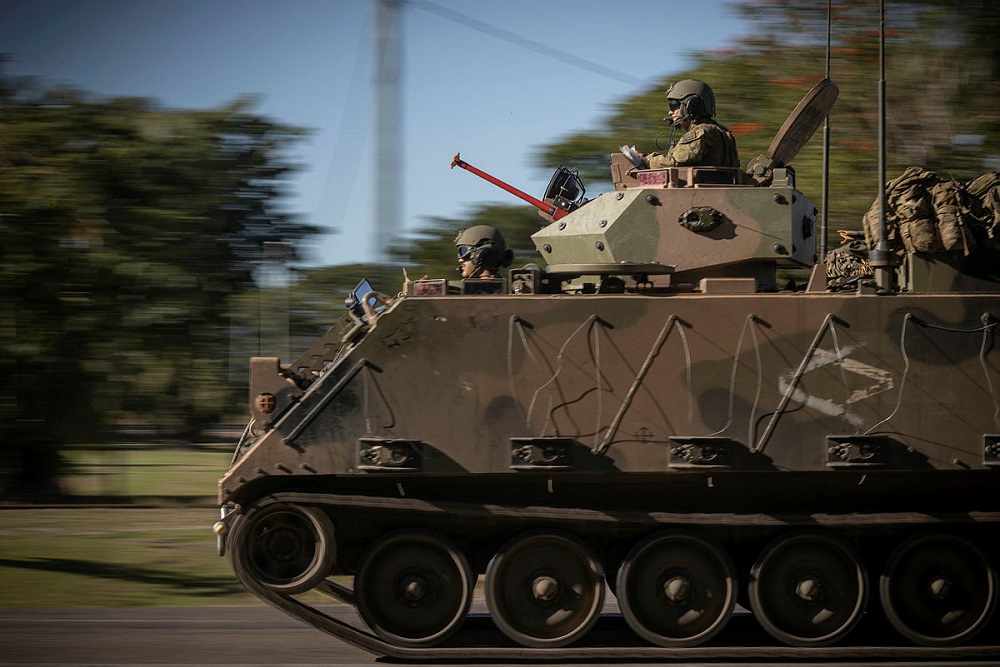Armoured vehicles will allow a better-protected ADF to conduct a wider range of operations

The strategic environment confronting Australia has led to significant debate by defence commentators on the force structure required to ensure that the Australian Defence Force can fight and win in a future conflict. Given the current ADF’s capability shortfalls, acquiring the appropriate balance of capabilities for the future is not a simple task. Growing budget pressures mean difficult choices are required.
Much of the analysis to date has focused on enhancements to air, maritime, space and cyber capabilities, demonstrating a limited appreciation for and understanding of the requirement for capable land forces. Some commentators have questioned the investment in the army’s combined-arms fighting system through the delivery of much-needed protected, mobile, lethal and connected infantry fighting vehicles. Criticisms of the land combat fighting system centre on two main arguments: first, that land forces won’t be relevant in any future conflict Australia is likely to be involved in and second, that the deployment of armoured vehicles in and through our region isn’t feasible and they wouldn’t be survivable in the expected theatres of conflict.
Predicting the nature of future conflict is fraught. However, when assessing the relevance of land forces, including the army’s combined-arms fighting system, through the lens of Australia’s security environment, there are credible scenarios across the conflict spectrum for which these capabilities are clearly needed.
Countries in our region face a deteriorating security environment due to ongoing social and economic challenges that will only be exacerbated by the impacts of climate change and ongoing global uncertainty. Others are dealing with violent insurgencies with the potential to exceed the capacity of their national security forces.
It’s plausible that Australia could be requested to provide forces to assist either in regaining and maintaining security and stability or in dealing with a highly capable and deadly insurgency. While these may be viewed as discretionary commitments for our government, the reality is that if we don’t respond, other nations will, undermining the regional partnerships that are so essential to our security. It is highly probable that such threats will be sponsored and supported by state actors, or well-resourced and well-networked non-state entities, resulting in the proliferation of sophisticated weapon systems well beyond the lethality of small arms. Unlike in the past, it won’t be feasible for Australia to rely on a military response based on lightly protected forces. Any response must include well-protected, highly lethal and mobile land forces.
Looking more broadly, Australia could be requested by the United Nations to contribute to peace enforcement or peacekeeping as part of the international community’s efforts to resolve conflict around the world. The potential lethality of such environments and the capacity for the belligerents to re-engage in hostilities would require a military contribution that included the army’s combined-arms fighting system.
In the worst-case scenario—a major conflict in our region—it’s unlikely that hostilities would be geographically constrained. An adversary will almost certainly look to deploy forces throughout our region in order to hold the US and its allies at a distance. It will be essential that these adversary forces be removed, and Australia will need to respond. Air, maritime, cyber and space capabilities will be required, but the employment of ground forces to close with and forcibly remove an adversary will be critical.
Those who argue that the deployment of the army’s combined-arms fighting system in and through Australia’s region wouldn’t be feasible or survivable due to our adversary’s long-range strike capabilities highlight the need for the ADF to invest in more flexible and agile littoral platforms to better enable dispersed, less-targetable projection of land combat power.
What some commentators fail to appreciate, however, is that when equipped with these littoral platforms, the forces capable of joint land combat will be able to manoeuvre to a place of operational advantage when effects across all domains are synchronised in time and space to establish a more permissive environment. While not enduring, this environment can be established for a specific period of time, within a defined geographic location to enable the manoeuvre of the army’s combined-arms fighting system to close with and defeat an adversary. This is the art of joint operations planning.
The relevance of the army’s combined-arms fighting system across the spectrum of conflict is clear, whether it be in support of our regional neighbours, through our contribution as a responsible member of the community of nations or in response to a major conflict in our region. While challenging, the deployment of land forces in our region is possible through the synchronisation and coordination of military effects across all domains.
With this understanding, it’s worth noting that the core element of the army’s current combat fighting system, the M113 armoured personnel carrier, is based on a vehicle introduced into service in the mid-1960s. While the M113 has undergone through-life upgrades, its protection, mobility and firepower are essentially that of the initial platform. As Chief of LTGEN Army Simon Stuart has
said, ‘We can and we must do better.’
As a nation, we have a moral obligation to ensure that the men and women who will defend us are afforded modern, capable and survivable land combat capabilities.
 Print This Post
Print This Post